Analysis of Agency and Competition Law
VerifiedAdded on 2020/10/22
|9
|3050
|136
AI Summary
The assignment provides a detailed analysis of agency and competition law in Australia, focusing on the relationship between agents and principals, as well as the role of regulators in promoting competition. It includes case studies such as ACCC v Flight Centre Travel Group and Sweeney v Boylan Nominees Pty Ltd, and discusses legal solutions for breach of duty and liability. The document also touches on the Banking Royal Commission and its implications for regulatory justification and good corporate culture.
Contribute Materials
Your contribution can guide someone’s learning journey. Share your
documents today.
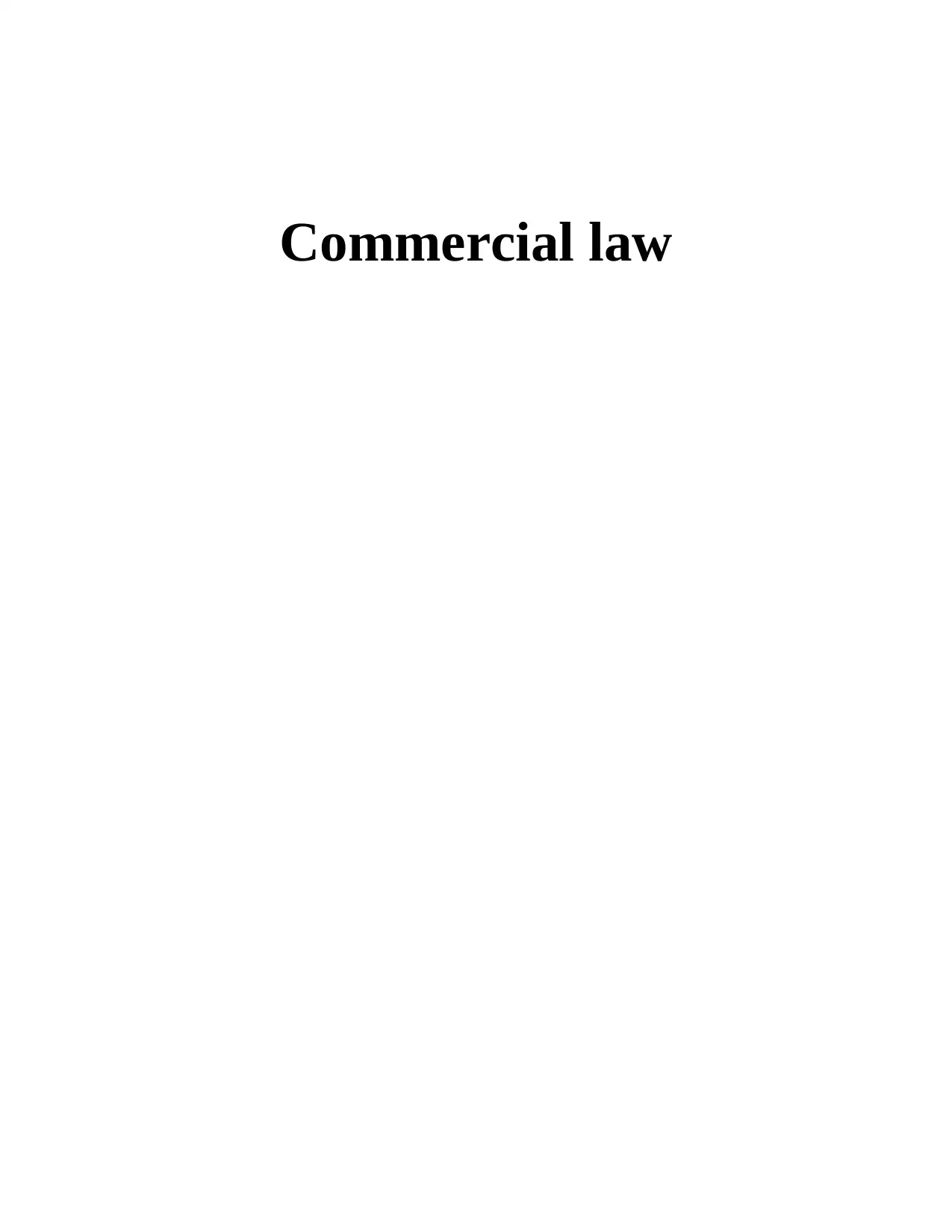
Commercial law
Secure Best Marks with AI Grader
Need help grading? Try our AI Grader for instant feedback on your assignments.
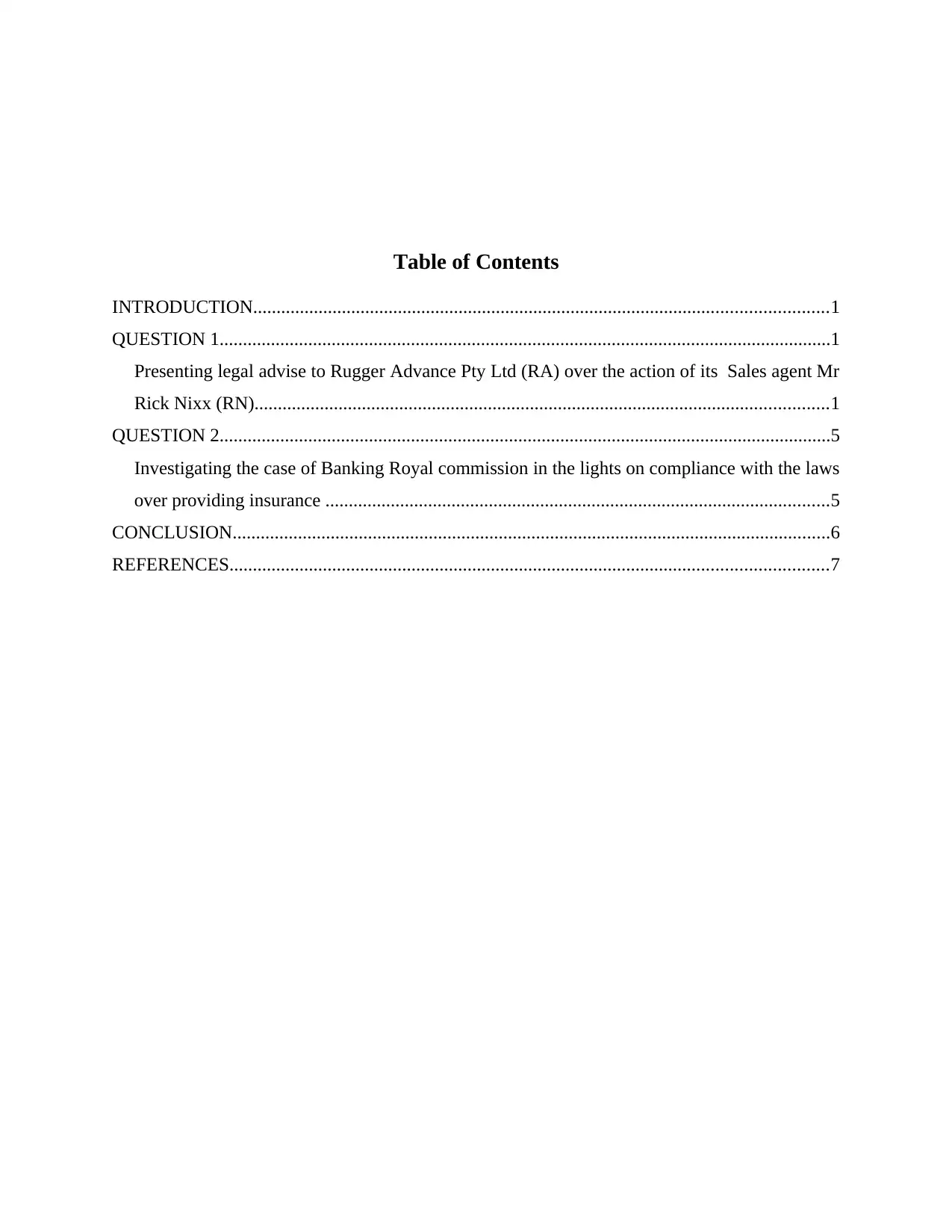
Table of Contents
INTRODUCTION...........................................................................................................................1
QUESTION 1...................................................................................................................................1
Presenting legal advise to Rugger Advance Pty Ltd (RA) over the action of its Sales agent Mr
Rick Nixx (RN)...........................................................................................................................1
QUESTION 2...................................................................................................................................5
Investigating the case of Banking Royal commission in the lights on compliance with the laws
over providing insurance ............................................................................................................5
CONCLUSION................................................................................................................................6
REFERENCES................................................................................................................................7
INTRODUCTION...........................................................................................................................1
QUESTION 1...................................................................................................................................1
Presenting legal advise to Rugger Advance Pty Ltd (RA) over the action of its Sales agent Mr
Rick Nixx (RN)...........................................................................................................................1
QUESTION 2...................................................................................................................................5
Investigating the case of Banking Royal commission in the lights on compliance with the laws
over providing insurance ............................................................................................................5
CONCLUSION................................................................................................................................6
REFERENCES................................................................................................................................7
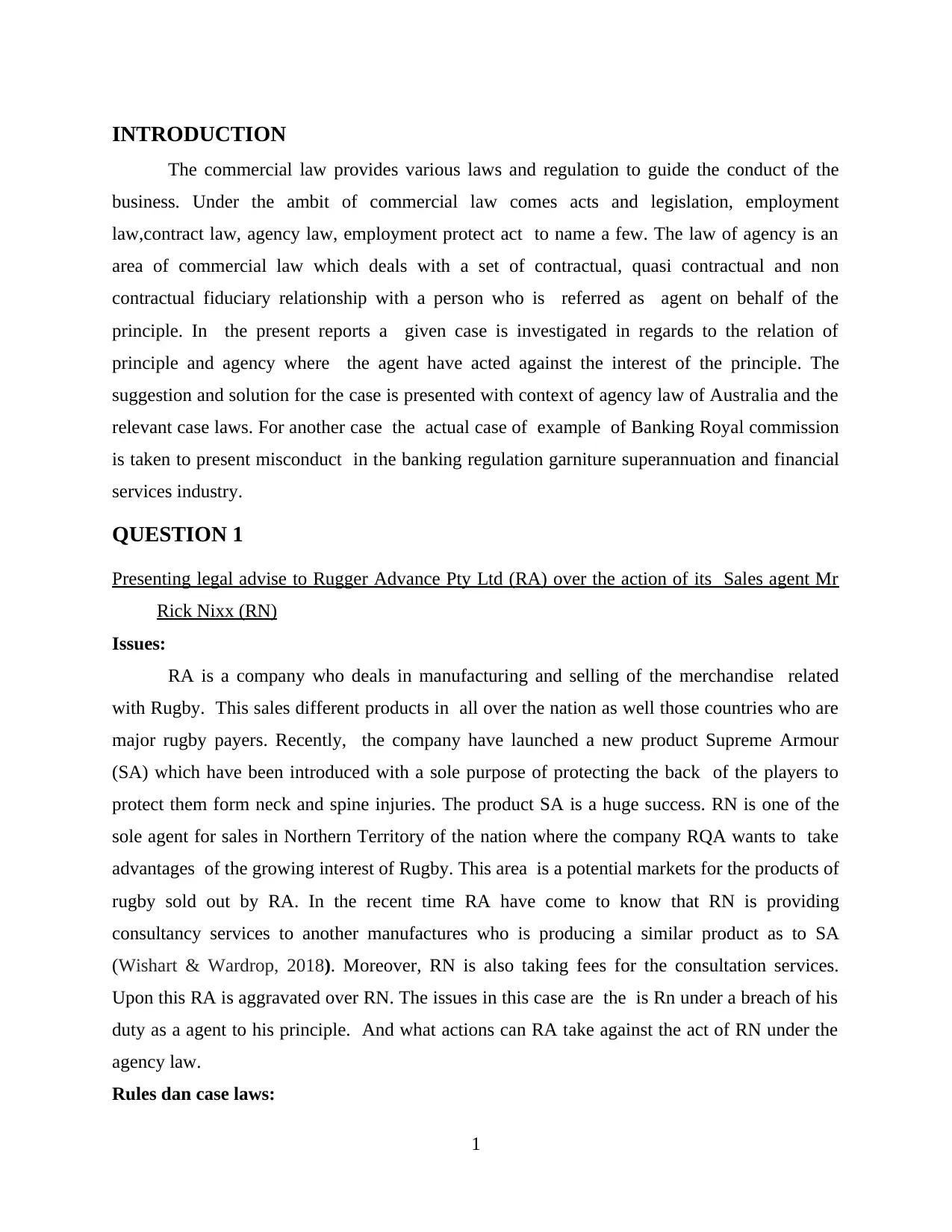
INTRODUCTION
The commercial law provides various laws and regulation to guide the conduct of the
business. Under the ambit of commercial law comes acts and legislation, employment
law,contract law, agency law, employment protect act to name a few. The law of agency is an
area of commercial law which deals with a set of contractual, quasi contractual and non
contractual fiduciary relationship with a person who is referred as agent on behalf of the
principle. In the present reports a given case is investigated in regards to the relation of
principle and agency where the agent have acted against the interest of the principle. The
suggestion and solution for the case is presented with context of agency law of Australia and the
relevant case laws. For another case the actual case of example of Banking Royal commission
is taken to present misconduct in the banking regulation garniture superannuation and financial
services industry.
QUESTION 1
Presenting legal advise to Rugger Advance Pty Ltd (RA) over the action of its Sales agent Mr
Rick Nixx (RN)
Issues:
RA is a company who deals in manufacturing and selling of the merchandise related
with Rugby. This sales different products in all over the nation as well those countries who are
major rugby payers. Recently, the company have launched a new product Supreme Armour
(SA) which have been introduced with a sole purpose of protecting the back of the players to
protect them form neck and spine injuries. The product SA is a huge success. RN is one of the
sole agent for sales in Northern Territory of the nation where the company RQA wants to take
advantages of the growing interest of Rugby. This area is a potential markets for the products of
rugby sold out by RA. In the recent time RA have come to know that RN is providing
consultancy services to another manufactures who is producing a similar product as to SA
(Wishart & Wardrop, 2018). Moreover, RN is also taking fees for the consultation services.
Upon this RA is aggravated over RN. The issues in this case are the is Rn under a breach of his
duty as a agent to his principle. And what actions can RA take against the act of RN under the
agency law.
Rules dan case laws:
1
The commercial law provides various laws and regulation to guide the conduct of the
business. Under the ambit of commercial law comes acts and legislation, employment
law,contract law, agency law, employment protect act to name a few. The law of agency is an
area of commercial law which deals with a set of contractual, quasi contractual and non
contractual fiduciary relationship with a person who is referred as agent on behalf of the
principle. In the present reports a given case is investigated in regards to the relation of
principle and agency where the agent have acted against the interest of the principle. The
suggestion and solution for the case is presented with context of agency law of Australia and the
relevant case laws. For another case the actual case of example of Banking Royal commission
is taken to present misconduct in the banking regulation garniture superannuation and financial
services industry.
QUESTION 1
Presenting legal advise to Rugger Advance Pty Ltd (RA) over the action of its Sales agent Mr
Rick Nixx (RN)
Issues:
RA is a company who deals in manufacturing and selling of the merchandise related
with Rugby. This sales different products in all over the nation as well those countries who are
major rugby payers. Recently, the company have launched a new product Supreme Armour
(SA) which have been introduced with a sole purpose of protecting the back of the players to
protect them form neck and spine injuries. The product SA is a huge success. RN is one of the
sole agent for sales in Northern Territory of the nation where the company RQA wants to take
advantages of the growing interest of Rugby. This area is a potential markets for the products of
rugby sold out by RA. In the recent time RA have come to know that RN is providing
consultancy services to another manufactures who is producing a similar product as to SA
(Wishart & Wardrop, 2018). Moreover, RN is also taking fees for the consultation services.
Upon this RA is aggravated over RN. The issues in this case are the is Rn under a breach of his
duty as a agent to his principle. And what actions can RA take against the act of RN under the
agency law.
Rules dan case laws:
1
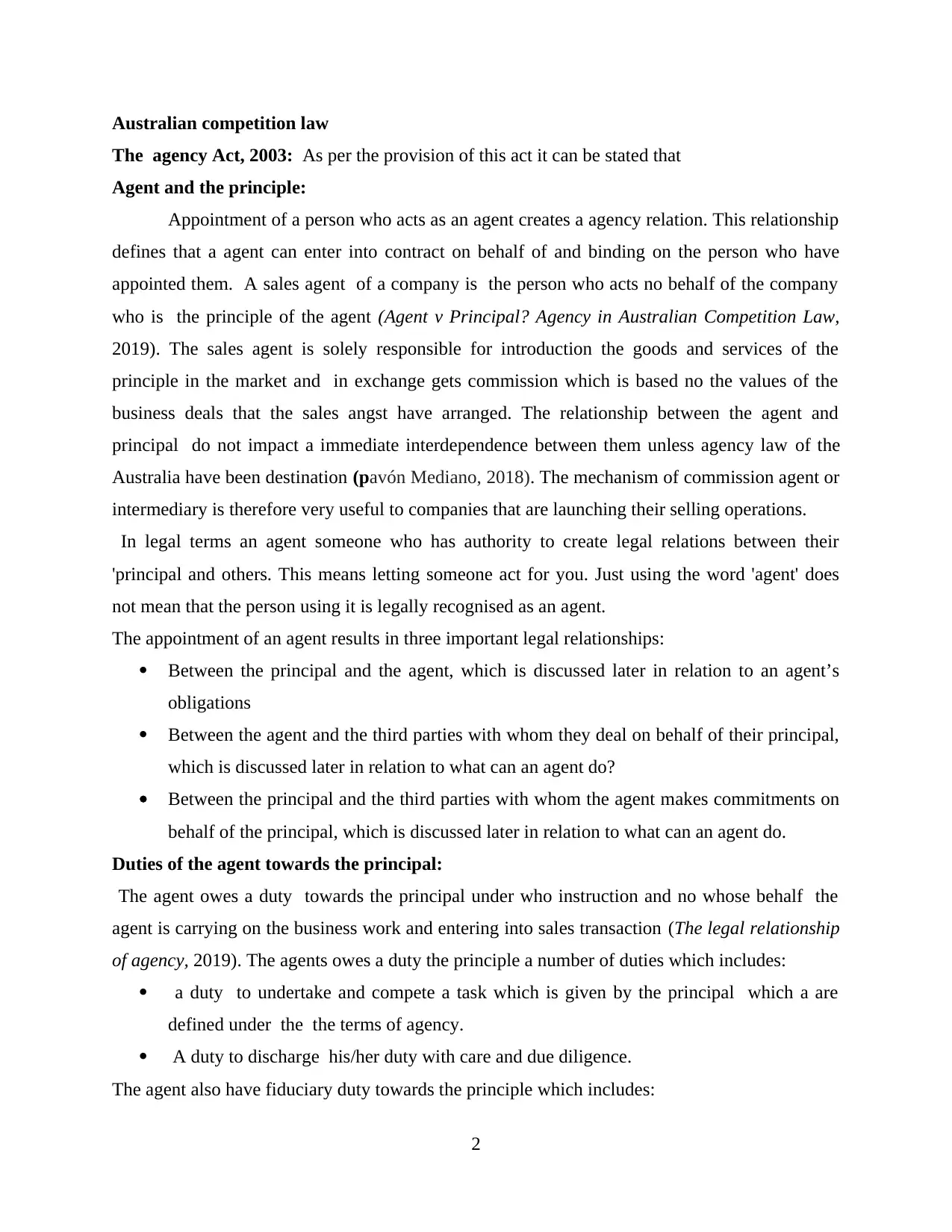
Australian competition law
The agency Act, 2003: As per the provision of this act it can be stated that
Agent and the principle:
Appointment of a person who acts as an agent creates a agency relation. This relationship
defines that a agent can enter into contract on behalf of and binding on the person who have
appointed them. A sales agent of a company is the person who acts no behalf of the company
who is the principle of the agent (Agent v Principal? Agency in Australian Competition Law,
2019). The sales agent is solely responsible for introduction the goods and services of the
principle in the market and in exchange gets commission which is based no the values of the
business deals that the sales angst have arranged. The relationship between the agent and
principal do not impact a immediate interdependence between them unless agency law of the
Australia have been destination (pavón Mediano, 2018). The mechanism of commission agent or
intermediary is therefore very useful to companies that are launching their selling operations.
In legal terms an agent someone who has authority to create legal relations between their
'principal and others. This means letting someone act for you. Just using the word 'agent' does
not mean that the person using it is legally recognised as an agent.
The appointment of an agent results in three important legal relationships:
Between the principal and the agent, which is discussed later in relation to an agent’s
obligations
Between the agent and the third parties with whom they deal on behalf of their principal,
which is discussed later in relation to what can an agent do?
Between the principal and the third parties with whom the agent makes commitments on
behalf of the principal, which is discussed later in relation to what can an agent do.
Duties of the agent towards the principal:
The agent owes a duty towards the principal under who instruction and no whose behalf the
agent is carrying on the business work and entering into sales transaction (The legal relationship
of agency, 2019). The agents owes a duty the principle a number of duties which includes:
a duty to undertake and compete a task which is given by the principal which a are
defined under the the terms of agency.
A duty to discharge his/her duty with care and due diligence.
The agent also have fiduciary duty towards the principle which includes:
2
The agency Act, 2003: As per the provision of this act it can be stated that
Agent and the principle:
Appointment of a person who acts as an agent creates a agency relation. This relationship
defines that a agent can enter into contract on behalf of and binding on the person who have
appointed them. A sales agent of a company is the person who acts no behalf of the company
who is the principle of the agent (Agent v Principal? Agency in Australian Competition Law,
2019). The sales agent is solely responsible for introduction the goods and services of the
principle in the market and in exchange gets commission which is based no the values of the
business deals that the sales angst have arranged. The relationship between the agent and
principal do not impact a immediate interdependence between them unless agency law of the
Australia have been destination (pavón Mediano, 2018). The mechanism of commission agent or
intermediary is therefore very useful to companies that are launching their selling operations.
In legal terms an agent someone who has authority to create legal relations between their
'principal and others. This means letting someone act for you. Just using the word 'agent' does
not mean that the person using it is legally recognised as an agent.
The appointment of an agent results in three important legal relationships:
Between the principal and the agent, which is discussed later in relation to an agent’s
obligations
Between the agent and the third parties with whom they deal on behalf of their principal,
which is discussed later in relation to what can an agent do?
Between the principal and the third parties with whom the agent makes commitments on
behalf of the principal, which is discussed later in relation to what can an agent do.
Duties of the agent towards the principal:
The agent owes a duty towards the principal under who instruction and no whose behalf the
agent is carrying on the business work and entering into sales transaction (The legal relationship
of agency, 2019). The agents owes a duty the principle a number of duties which includes:
a duty to undertake and compete a task which is given by the principal which a are
defined under the the terms of agency.
A duty to discharge his/her duty with care and due diligence.
The agent also have fiduciary duty towards the principle which includes:
2
Secure Best Marks with AI Grader
Need help grading? Try our AI Grader for instant feedback on your assignments.
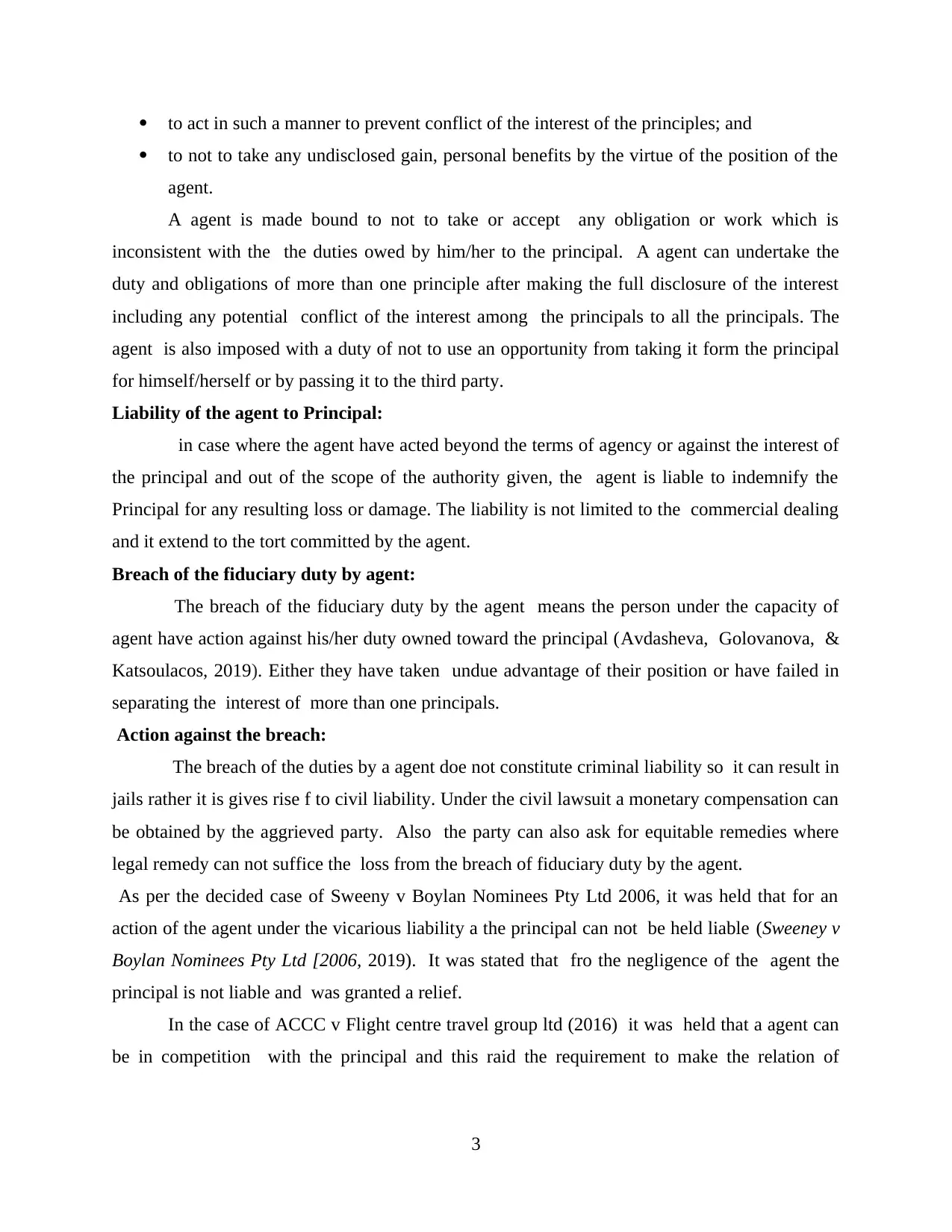
to act in such a manner to prevent conflict of the interest of the principles; and
to not to take any undisclosed gain, personal benefits by the virtue of the position of the
agent.
A agent is made bound to not to take or accept any obligation or work which is
inconsistent with the the duties owed by him/her to the principal. A agent can undertake the
duty and obligations of more than one principle after making the full disclosure of the interest
including any potential conflict of the interest among the principals to all the principals. The
agent is also imposed with a duty of not to use an opportunity from taking it form the principal
for himself/herself or by passing it to the third party.
Liability of the agent to Principal:
in case where the agent have acted beyond the terms of agency or against the interest of
the principal and out of the scope of the authority given, the agent is liable to indemnify the
Principal for any resulting loss or damage. The liability is not limited to the commercial dealing
and it extend to the tort committed by the agent.
Breach of the fiduciary duty by agent:
The breach of the fiduciary duty by the agent means the person under the capacity of
agent have action against his/her duty owned toward the principal (Avdasheva, Golovanova, &
Katsoulacos, 2019). Either they have taken undue advantage of their position or have failed in
separating the interest of more than one principals.
Action against the breach:
The breach of the duties by a agent doe not constitute criminal liability so it can result in
jails rather it is gives rise f to civil liability. Under the civil lawsuit a monetary compensation can
be obtained by the aggrieved party. Also the party can also ask for equitable remedies where
legal remedy can not suffice the loss from the breach of fiduciary duty by the agent.
As per the decided case of Sweeny v Boylan Nominees Pty Ltd 2006, it was held that for an
action of the agent under the vicarious liability a the principal can not be held liable (Sweeney v
Boylan Nominees Pty Ltd [2006, 2019). It was stated that fro the negligence of the agent the
principal is not liable and was granted a relief.
In the case of ACCC v Flight centre travel group ltd (2016) it was held that a agent can
be in competition with the principal and this raid the requirement to make the relation of
3
to not to take any undisclosed gain, personal benefits by the virtue of the position of the
agent.
A agent is made bound to not to take or accept any obligation or work which is
inconsistent with the the duties owed by him/her to the principal. A agent can undertake the
duty and obligations of more than one principle after making the full disclosure of the interest
including any potential conflict of the interest among the principals to all the principals. The
agent is also imposed with a duty of not to use an opportunity from taking it form the principal
for himself/herself or by passing it to the third party.
Liability of the agent to Principal:
in case where the agent have acted beyond the terms of agency or against the interest of
the principal and out of the scope of the authority given, the agent is liable to indemnify the
Principal for any resulting loss or damage. The liability is not limited to the commercial dealing
and it extend to the tort committed by the agent.
Breach of the fiduciary duty by agent:
The breach of the fiduciary duty by the agent means the person under the capacity of
agent have action against his/her duty owned toward the principal (Avdasheva, Golovanova, &
Katsoulacos, 2019). Either they have taken undue advantage of their position or have failed in
separating the interest of more than one principals.
Action against the breach:
The breach of the duties by a agent doe not constitute criminal liability so it can result in
jails rather it is gives rise f to civil liability. Under the civil lawsuit a monetary compensation can
be obtained by the aggrieved party. Also the party can also ask for equitable remedies where
legal remedy can not suffice the loss from the breach of fiduciary duty by the agent.
As per the decided case of Sweeny v Boylan Nominees Pty Ltd 2006, it was held that for an
action of the agent under the vicarious liability a the principal can not be held liable (Sweeney v
Boylan Nominees Pty Ltd [2006, 2019). It was stated that fro the negligence of the agent the
principal is not liable and was granted a relief.
In the case of ACCC v Flight centre travel group ltd (2016) it was held that a agent can
be in competition with the principal and this raid the requirement to make the relation of
3
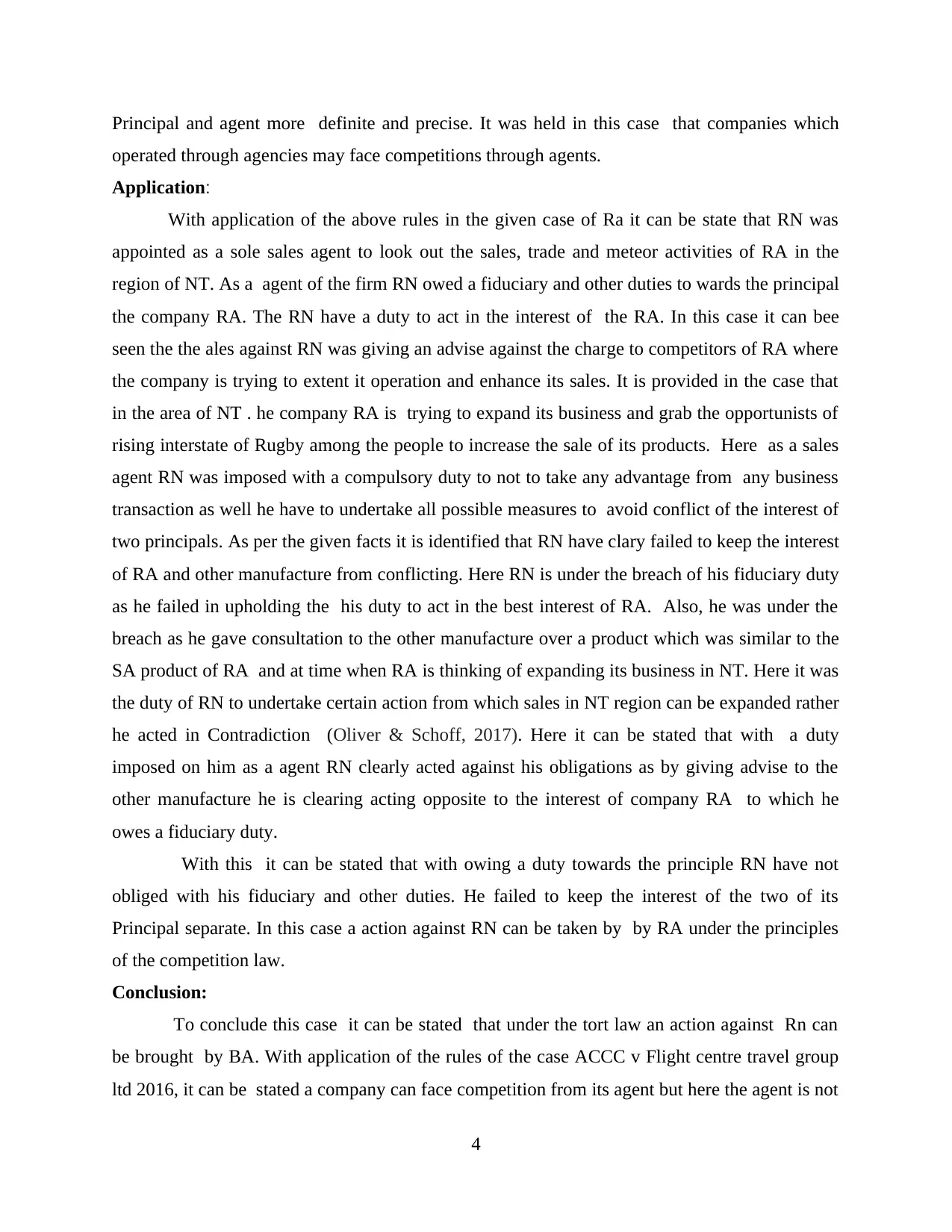
Principal and agent more definite and precise. It was held in this case that companies which
operated through agencies may face competitions through agents.
Application:
With application of the above rules in the given case of Ra it can be state that RN was
appointed as a sole sales agent to look out the sales, trade and meteor activities of RA in the
region of NT. As a agent of the firm RN owed a fiduciary and other duties to wards the principal
the company RA. The RN have a duty to act in the interest of the RA. In this case it can bee
seen the the ales against RN was giving an advise against the charge to competitors of RA where
the company is trying to extent it operation and enhance its sales. It is provided in the case that
in the area of NT . he company RA is trying to expand its business and grab the opportunists of
rising interstate of Rugby among the people to increase the sale of its products. Here as a sales
agent RN was imposed with a compulsory duty to not to take any advantage from any business
transaction as well he have to undertake all possible measures to avoid conflict of the interest of
two principals. As per the given facts it is identified that RN have clary failed to keep the interest
of RA and other manufacture from conflicting. Here RN is under the breach of his fiduciary duty
as he failed in upholding the his duty to act in the best interest of RA. Also, he was under the
breach as he gave consultation to the other manufacture over a product which was similar to the
SA product of RA and at time when RA is thinking of expanding its business in NT. Here it was
the duty of RN to undertake certain action from which sales in NT region can be expanded rather
he acted in Contradiction (Oliver & Schoff, 2017). Here it can be stated that with a duty
imposed on him as a agent RN clearly acted against his obligations as by giving advise to the
other manufacture he is clearing acting opposite to the interest of company RA to which he
owes a fiduciary duty.
With this it can be stated that with owing a duty towards the principle RN have not
obliged with his fiduciary and other duties. He failed to keep the interest of the two of its
Principal separate. In this case a action against RN can be taken by by RA under the principles
of the competition law.
Conclusion:
To conclude this case it can be stated that under the tort law an action against Rn can
be brought by BA. With application of the rules of the case ACCC v Flight centre travel group
ltd 2016, it can be stated a company can face competition from its agent but here the agent is not
4
operated through agencies may face competitions through agents.
Application:
With application of the above rules in the given case of Ra it can be state that RN was
appointed as a sole sales agent to look out the sales, trade and meteor activities of RA in the
region of NT. As a agent of the firm RN owed a fiduciary and other duties to wards the principal
the company RA. The RN have a duty to act in the interest of the RA. In this case it can bee
seen the the ales against RN was giving an advise against the charge to competitors of RA where
the company is trying to extent it operation and enhance its sales. It is provided in the case that
in the area of NT . he company RA is trying to expand its business and grab the opportunists of
rising interstate of Rugby among the people to increase the sale of its products. Here as a sales
agent RN was imposed with a compulsory duty to not to take any advantage from any business
transaction as well he have to undertake all possible measures to avoid conflict of the interest of
two principals. As per the given facts it is identified that RN have clary failed to keep the interest
of RA and other manufacture from conflicting. Here RN is under the breach of his fiduciary duty
as he failed in upholding the his duty to act in the best interest of RA. Also, he was under the
breach as he gave consultation to the other manufacture over a product which was similar to the
SA product of RA and at time when RA is thinking of expanding its business in NT. Here it was
the duty of RN to undertake certain action from which sales in NT region can be expanded rather
he acted in Contradiction (Oliver & Schoff, 2017). Here it can be stated that with a duty
imposed on him as a agent RN clearly acted against his obligations as by giving advise to the
other manufacture he is clearing acting opposite to the interest of company RA to which he
owes a fiduciary duty.
With this it can be stated that with owing a duty towards the principle RN have not
obliged with his fiduciary and other duties. He failed to keep the interest of the two of its
Principal separate. In this case a action against RN can be taken by by RA under the principles
of the competition law.
Conclusion:
To conclude this case it can be stated that under the tort law an action against Rn can
be brought by BA. With application of the rules of the case ACCC v Flight centre travel group
ltd 2016, it can be stated a company can face competition from its agent but here the agent is not
4
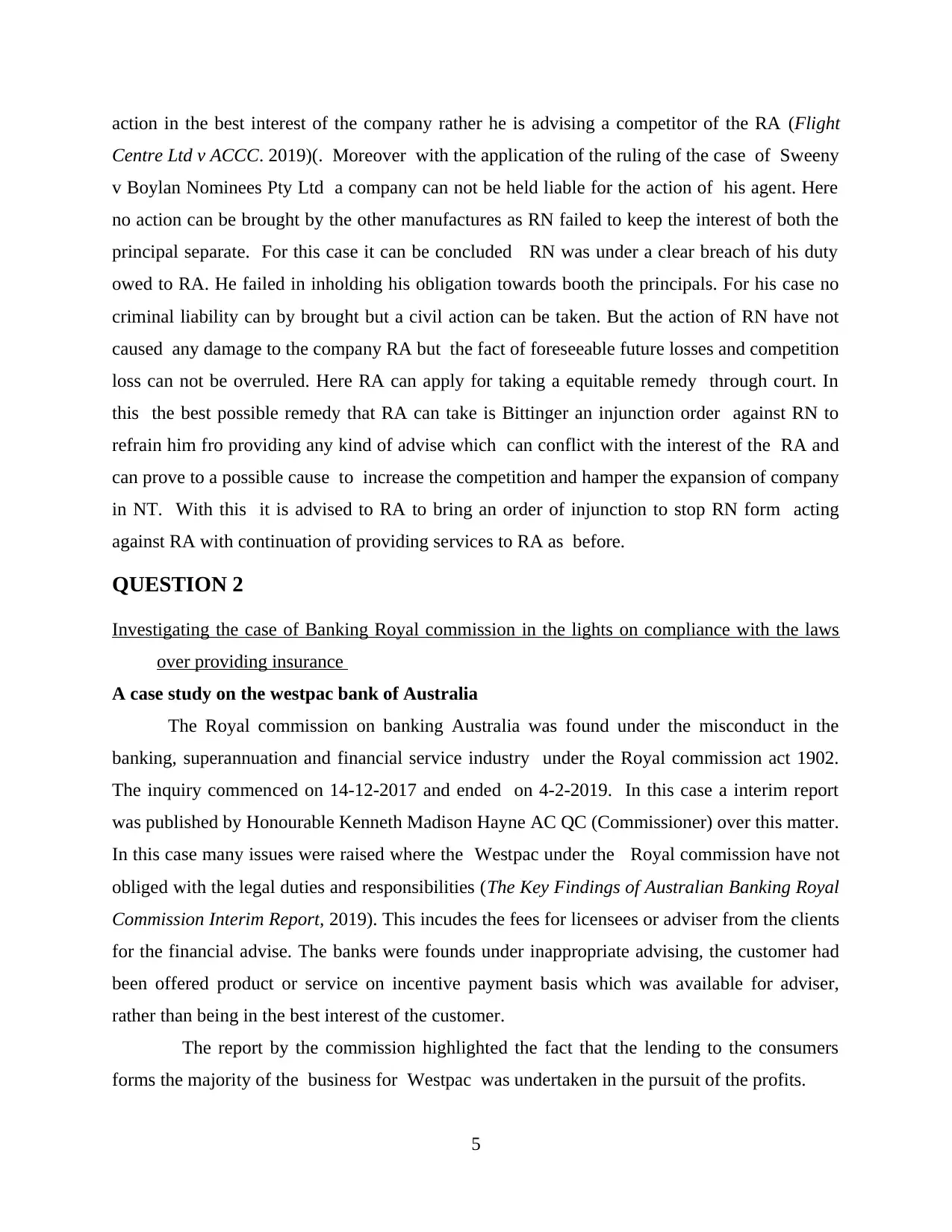
action in the best interest of the company rather he is advising a competitor of the RA (Flight
Centre Ltd v ACCC. 2019)(. Moreover with the application of the ruling of the case of Sweeny
v Boylan Nominees Pty Ltd a company can not be held liable for the action of his agent. Here
no action can be brought by the other manufactures as RN failed to keep the interest of both the
principal separate. For this case it can be concluded RN was under a clear breach of his duty
owed to RA. He failed in inholding his obligation towards booth the principals. For his case no
criminal liability can by brought but a civil action can be taken. But the action of RN have not
caused any damage to the company RA but the fact of foreseeable future losses and competition
loss can not be overruled. Here RA can apply for taking a equitable remedy through court. In
this the best possible remedy that RA can take is Bittinger an injunction order against RN to
refrain him fro providing any kind of advise which can conflict with the interest of the RA and
can prove to a possible cause to increase the competition and hamper the expansion of company
in NT. With this it is advised to RA to bring an order of injunction to stop RN form acting
against RA with continuation of providing services to RA as before.
QUESTION 2
Investigating the case of Banking Royal commission in the lights on compliance with the laws
over providing insurance
A case study on the westpac bank of Australia
The Royal commission on banking Australia was found under the misconduct in the
banking, superannuation and financial service industry under the Royal commission act 1902.
The inquiry commenced on 14-12-2017 and ended on 4-2-2019. In this case a interim report
was published by Honourable Kenneth Madison Hayne AC QC (Commissioner) over this matter.
In this case many issues were raised where the Westpac under the Royal commission have not
obliged with the legal duties and responsibilities (The Key Findings of Australian Banking Royal
Commission Interim Report, 2019). This incudes the fees for licensees or adviser from the clients
for the financial advise. The banks were founds under inappropriate advising, the customer had
been offered product or service on incentive payment basis which was available for adviser,
rather than being in the best interest of the customer.
The report by the commission highlighted the fact that the lending to the consumers
forms the majority of the business for Westpac was undertaken in the pursuit of the profits.
5
Centre Ltd v ACCC. 2019)(. Moreover with the application of the ruling of the case of Sweeny
v Boylan Nominees Pty Ltd a company can not be held liable for the action of his agent. Here
no action can be brought by the other manufactures as RN failed to keep the interest of both the
principal separate. For this case it can be concluded RN was under a clear breach of his duty
owed to RA. He failed in inholding his obligation towards booth the principals. For his case no
criminal liability can by brought but a civil action can be taken. But the action of RN have not
caused any damage to the company RA but the fact of foreseeable future losses and competition
loss can not be overruled. Here RA can apply for taking a equitable remedy through court. In
this the best possible remedy that RA can take is Bittinger an injunction order against RN to
refrain him fro providing any kind of advise which can conflict with the interest of the RA and
can prove to a possible cause to increase the competition and hamper the expansion of company
in NT. With this it is advised to RA to bring an order of injunction to stop RN form acting
against RA with continuation of providing services to RA as before.
QUESTION 2
Investigating the case of Banking Royal commission in the lights on compliance with the laws
over providing insurance
A case study on the westpac bank of Australia
The Royal commission on banking Australia was found under the misconduct in the
banking, superannuation and financial service industry under the Royal commission act 1902.
The inquiry commenced on 14-12-2017 and ended on 4-2-2019. In this case a interim report
was published by Honourable Kenneth Madison Hayne AC QC (Commissioner) over this matter.
In this case many issues were raised where the Westpac under the Royal commission have not
obliged with the legal duties and responsibilities (The Key Findings of Australian Banking Royal
Commission Interim Report, 2019). This incudes the fees for licensees or adviser from the clients
for the financial advise. The banks were founds under inappropriate advising, the customer had
been offered product or service on incentive payment basis which was available for adviser,
rather than being in the best interest of the customer.
The report by the commission highlighted the fact that the lending to the consumers
forms the majority of the business for Westpac was undertaken in the pursuit of the profits.
5
Paraphrase This Document
Need a fresh take? Get an instant paraphrase of this document with our AI Paraphraser
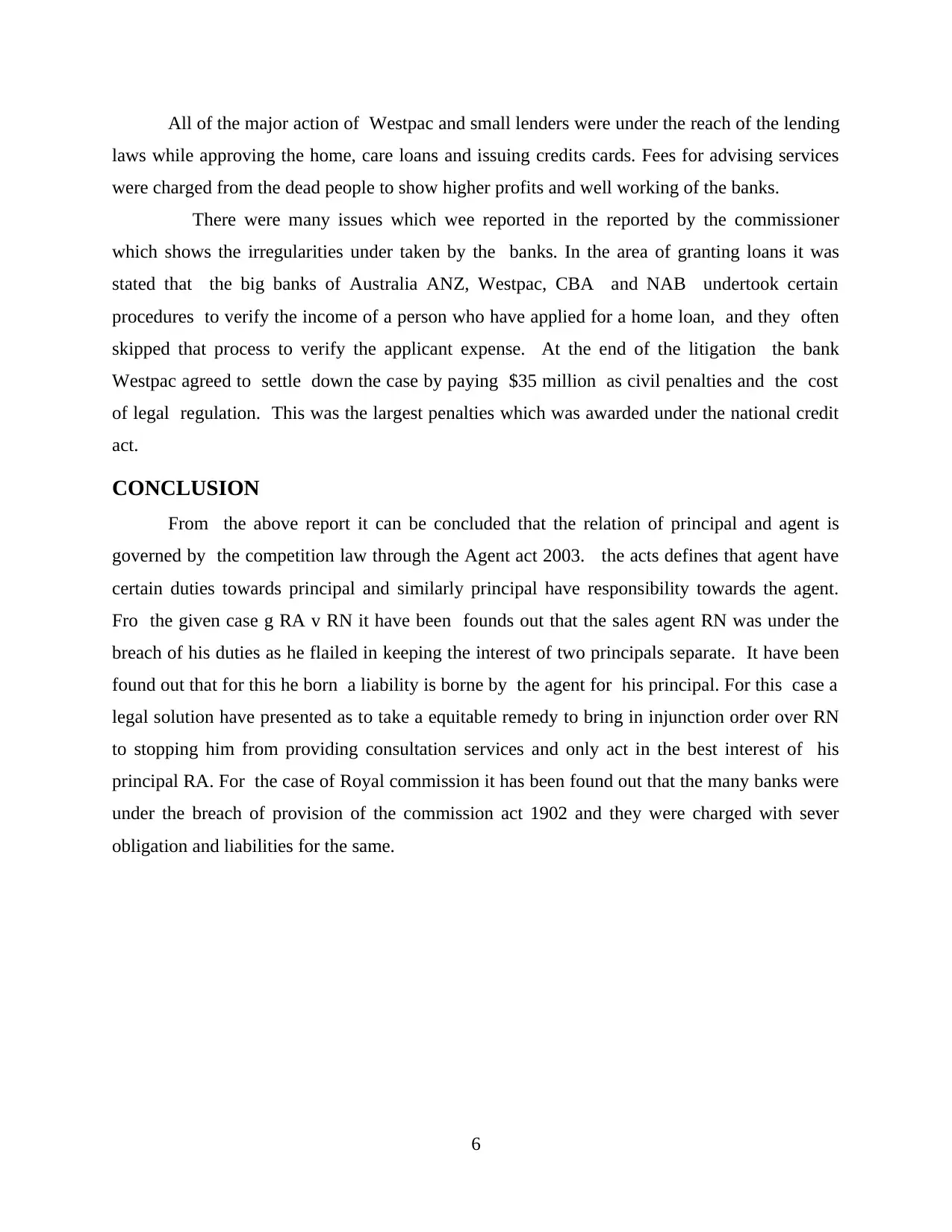
All of the major action of Westpac and small lenders were under the reach of the lending
laws while approving the home, care loans and issuing credits cards. Fees for advising services
were charged from the dead people to show higher profits and well working of the banks.
There were many issues which wee reported in the reported by the commissioner
which shows the irregularities under taken by the banks. In the area of granting loans it was
stated that the big banks of Australia ANZ, Westpac, CBA and NAB undertook certain
procedures to verify the income of a person who have applied for a home loan, and they often
skipped that process to verify the applicant expense. At the end of the litigation the bank
Westpac agreed to settle down the case by paying $35 million as civil penalties and the cost
of legal regulation. This was the largest penalties which was awarded under the national credit
act.
CONCLUSION
From the above report it can be concluded that the relation of principal and agent is
governed by the competition law through the Agent act 2003. the acts defines that agent have
certain duties towards principal and similarly principal have responsibility towards the agent.
Fro the given case g RA v RN it have been founds out that the sales agent RN was under the
breach of his duties as he flailed in keeping the interest of two principals separate. It have been
found out that for this he born a liability is borne by the agent for his principal. For this case a
legal solution have presented as to take a equitable remedy to bring in injunction order over RN
to stopping him from providing consultation services and only act in the best interest of his
principal RA. For the case of Royal commission it has been found out that the many banks were
under the breach of provision of the commission act 1902 and they were charged with sever
obligation and liabilities for the same.
6
laws while approving the home, care loans and issuing credits cards. Fees for advising services
were charged from the dead people to show higher profits and well working of the banks.
There were many issues which wee reported in the reported by the commissioner
which shows the irregularities under taken by the banks. In the area of granting loans it was
stated that the big banks of Australia ANZ, Westpac, CBA and NAB undertook certain
procedures to verify the income of a person who have applied for a home loan, and they often
skipped that process to verify the applicant expense. At the end of the litigation the bank
Westpac agreed to settle down the case by paying $35 million as civil penalties and the cost
of legal regulation. This was the largest penalties which was awarded under the national credit
act.
CONCLUSION
From the above report it can be concluded that the relation of principal and agent is
governed by the competition law through the Agent act 2003. the acts defines that agent have
certain duties towards principal and similarly principal have responsibility towards the agent.
Fro the given case g RA v RN it have been founds out that the sales agent RN was under the
breach of his duties as he flailed in keeping the interest of two principals separate. It have been
found out that for this he born a liability is borne by the agent for his principal. For this case a
legal solution have presented as to take a equitable remedy to bring in injunction order over RN
to stopping him from providing consultation services and only act in the best interest of his
principal RA. For the case of Royal commission it has been found out that the many banks were
under the breach of provision of the commission act 1902 and they were charged with sever
obligation and liabilities for the same.
6
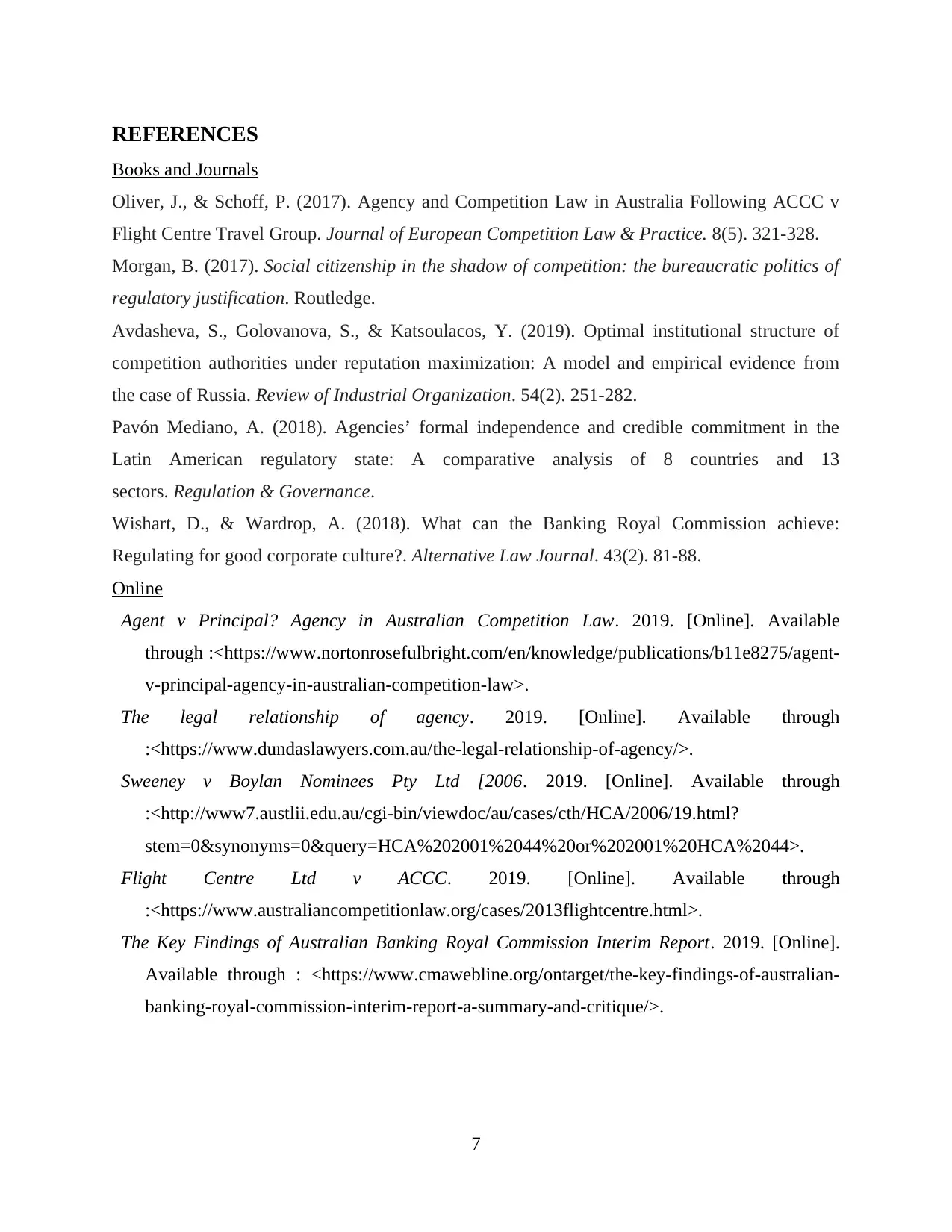
REFERENCES
Books and Journals
Oliver, J., & Schoff, P. (2017). Agency and Competition Law in Australia Following ACCC v
Flight Centre Travel Group. Journal of European Competition Law & Practice. 8(5). 321-328.
Morgan, B. (2017). Social citizenship in the shadow of competition: the bureaucratic politics of
regulatory justification. Routledge.
Avdasheva, S., Golovanova, S., & Katsoulacos, Y. (2019). Optimal institutional structure of
competition authorities under reputation maximization: A model and empirical evidence from
the case of Russia. Review of Industrial Organization. 54(2). 251-282.
Pavón Mediano, A. (2018). Agencies’ formal independence and credible commitment in the
Latin American regulatory state: A comparative analysis of 8 countries and 13
sectors. Regulation & Governance.
Wishart, D., & Wardrop, A. (2018). What can the Banking Royal Commission achieve:
Regulating for good corporate culture?. Alternative Law Journal. 43(2). 81-88.
Online
Agent v Principal? Agency in Australian Competition Law. 2019. [Online]. Available
through :<https://www.nortonrosefulbright.com/en/knowledge/publications/b11e8275/agent-
v-principal-agency-in-australian-competition-law>.
The legal relationship of agency. 2019. [Online]. Available through
:<https://www.dundaslawyers.com.au/the-legal-relationship-of-agency/>.
Sweeney v Boylan Nominees Pty Ltd [2006. 2019. [Online]. Available through
:<http://www7.austlii.edu.au/cgi-bin/viewdoc/au/cases/cth/HCA/2006/19.html?
stem=0&synonyms=0&query=HCA%202001%2044%20or%202001%20HCA%2044>.
Flight Centre Ltd v ACCC. 2019. [Online]. Available through
:<https://www.australiancompetitionlaw.org/cases/2013flightcentre.html>.
The Key Findings of Australian Banking Royal Commission Interim Report. 2019. [Online].
Available through : <https://www.cmawebline.org/ontarget/the-key-findings-of-australian-
banking-royal-commission-interim-report-a-summary-and-critique/>.
7
Books and Journals
Oliver, J., & Schoff, P. (2017). Agency and Competition Law in Australia Following ACCC v
Flight Centre Travel Group. Journal of European Competition Law & Practice. 8(5). 321-328.
Morgan, B. (2017). Social citizenship in the shadow of competition: the bureaucratic politics of
regulatory justification. Routledge.
Avdasheva, S., Golovanova, S., & Katsoulacos, Y. (2019). Optimal institutional structure of
competition authorities under reputation maximization: A model and empirical evidence from
the case of Russia. Review of Industrial Organization. 54(2). 251-282.
Pavón Mediano, A. (2018). Agencies’ formal independence and credible commitment in the
Latin American regulatory state: A comparative analysis of 8 countries and 13
sectors. Regulation & Governance.
Wishart, D., & Wardrop, A. (2018). What can the Banking Royal Commission achieve:
Regulating for good corporate culture?. Alternative Law Journal. 43(2). 81-88.
Online
Agent v Principal? Agency in Australian Competition Law. 2019. [Online]. Available
through :<https://www.nortonrosefulbright.com/en/knowledge/publications/b11e8275/agent-
v-principal-agency-in-australian-competition-law>.
The legal relationship of agency. 2019. [Online]. Available through
:<https://www.dundaslawyers.com.au/the-legal-relationship-of-agency/>.
Sweeney v Boylan Nominees Pty Ltd [2006. 2019. [Online]. Available through
:<http://www7.austlii.edu.au/cgi-bin/viewdoc/au/cases/cth/HCA/2006/19.html?
stem=0&synonyms=0&query=HCA%202001%2044%20or%202001%20HCA%2044>.
Flight Centre Ltd v ACCC. 2019. [Online]. Available through
:<https://www.australiancompetitionlaw.org/cases/2013flightcentre.html>.
The Key Findings of Australian Banking Royal Commission Interim Report. 2019. [Online].
Available through : <https://www.cmawebline.org/ontarget/the-key-findings-of-australian-
banking-royal-commission-interim-report-a-summary-and-critique/>.
7
1 out of 9
Related Documents
Your All-in-One AI-Powered Toolkit for Academic Success.
+13062052269
info@desklib.com
Available 24*7 on WhatsApp / Email
![[object Object]](/_next/static/media/star-bottom.7253800d.svg)
Unlock your academic potential
© 2024 | Zucol Services PVT LTD | All rights reserved.





